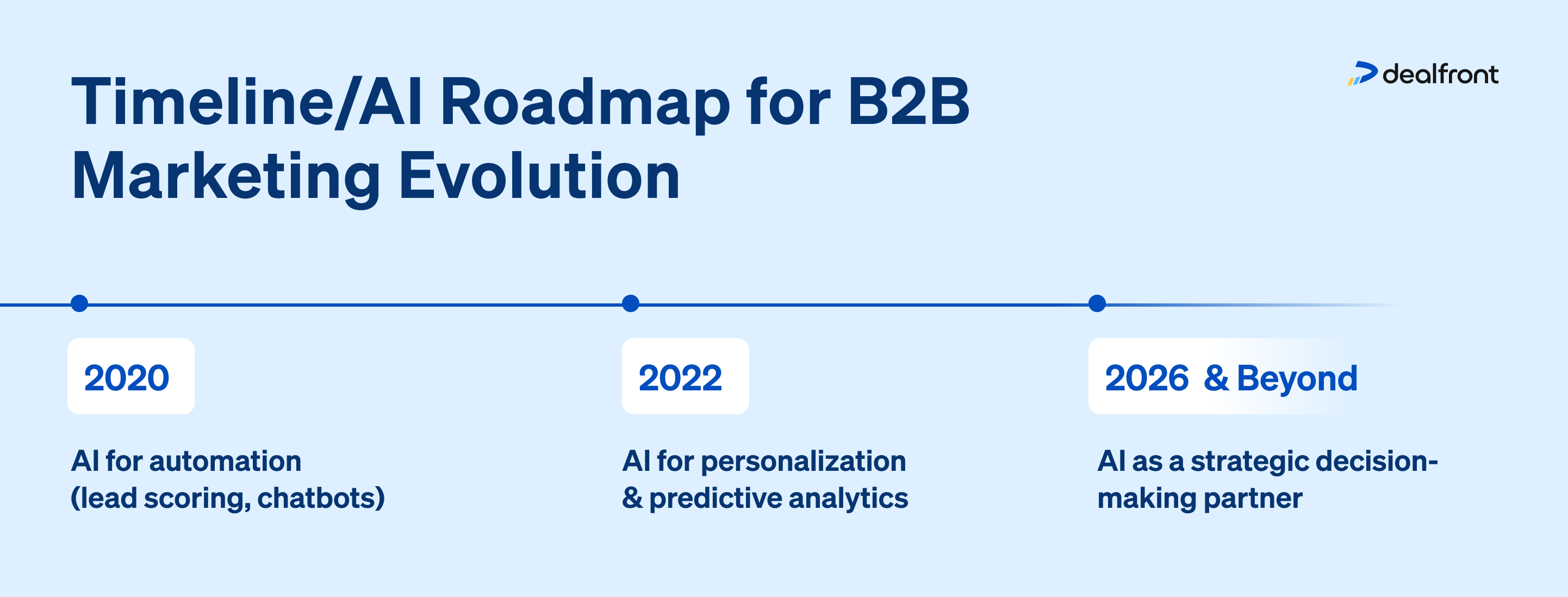The Future of B2B: Taking Advantage Of AI Automation to Drive Success
The landscape of B2B is moving as firms progressively turn to AI automation for critical advantage. This transformation assures to enhance efficiency and client engagement with advanced modern technologies. The combination of these tools is not without its difficulties. Understanding exactly how businesses can browse this evolving surface will certainly be vital for future success. What variables will figure out the effectiveness of AI in this market? The solutions may redefine standard business designs.
Recognizing AI Automation in B2B
As businesses progressively look for efficiency, comprehending AI automation in B2B comes to be important. AI automation describes using synthetic knowledge modern technologies to streamline and improve company procedures. In the B2B field, this entails the integration of AI tools to manage jobs such as information analysis, customer interactions, and supply chain operations. By leveraging maker learning and natural language processing, business can enhance precision, minimize human mistake, and quicken decision-making (Growth Systems For B2B). AI automation assists in the handling of huge volumes of information, enabling organizations to draw out valuable insights and enhance their procedures. As companies browse this technological landscape, a complete grip of AI automation's capabilities will empower them to stay competitive and responsive to market needs
Secret Advantages of AI Automation for Organizations
While several businesses grapple with increasing operational demands, AI automation presents numerous benefits that can significantly improve their performance. One considerable advantage is efficiency; AI systems can carry out repetitive tasks faster and with better precision than human beings, therefore minimizing errors and releasing up staff members for more critical initiatives. Furthermore, AI automation enables data-driven decision-making by analyzing vast datasets quickly, giving understandings that notify company techniques. Cost decrease is one more essential benefit, as automation decreases labor expenses and optimizes source appropriation. AI can boost scalability, enabling businesses to adjust to market modifications swiftly. Inevitably, the combination of AI automation fosters technology, allowing firms to stay competitive in a swiftly developing landscape.
Transforming Client Experiences With AI
AI is reshaping client experiences by enhancing and making it possible for customized communications interaction. Via the application of anticipating analytics, companies can prepare for customer requirements and choices, resulting in much more tailored solutions. Additionally, enhancing assistance processes with AI innovation boosts efficiency and contentment, ultimately changing the total customer journey.
Individualized Communications and Engagement
Customized communications have actually become a foundation of reliable customer interaction in the B2B landscape. By leveraging AI-driven options, organizations can tailor their communication and offerings to satisfy the special demands of each customer. Automated systems analyze client information, choices, and actions, enabling organizations to create customized experiences that resonate with their audience. This level of personalization not only improves client fulfillment however likewise promotes long-lasting loyalty. Furthermore, AI devices assist in real-time communications, enabling services to react quickly and efficiently to queries and comments. As a result, companies can build stronger partnerships with customers, making certain that their solutions line up with developing expectations. Ultimately, tailored involvement with AI causes improved outcomes and continual success in the affordable B2B market.
Predictive Analytics Implementation
As services increasingly look for to enhance consumer experiences, executing anticipating analytics has arised as an essential strategy in the B2B market. By leveraging data-driven understandings, organizations can prepare for customer requirements and preferences, enabling them to customize their offerings better. Predictive analytics makes use of innovative algorithms and historic information to forecast future actions, allowing services to recognize prospective obstacles and opportunities. This positive approach not only boosts customer fulfillment yet also promotes commitment by delivering relevant and timely options. In addition, predictive analytics assists in resource appropriation, ensuring that advertising initiatives are focused on high-value prospects. Ultimately, the combination of anticipating analytics outfits B2B firms with the tools necessary to change consumer interactions and drive long-lasting success in a progressively affordable landscape.
Streamlining Assistance Processes
Enhancing customer experiences in the B2B sector expands beyond anticipating analytics; simplifying support processes plays a vital function. By incorporating AI-driven options, companies can improve and automate routine inquiries response times, leading to heightened customer satisfaction. Chatbots and virtual aides supply 24/7 assistance, attending to client needs quickly and decreasing the burden on human agents. This automation permits groups to concentrate on complicated problems, fostering even more purposeful communications. Additionally, AI tools can analyze Discover More assistance data to recognize fads and areas for improvement, ensuring continual improvement of service top quality. As organizations take on these modern technologies, they place themselves as customer-centric and receptive, eventually driving commitment and service growth in a significantly competitive landscape.
Streamlining Workflow and Processes
Streamlining operations and procedures in B2B environments is essential for boosting overall performance. By enhancing operations effectiveness and automating regular tasks, organizations can minimize hand-operated mistakes and maximize valuable resources. This shift not only boosts productivity but also makes it possible for groups to concentrate on tactical campaigns that drive growth.
Enhancing Workflow Effectiveness
Maximizing workflow effectiveness is important for services looking for to enhance and decrease functional prices productivity. By examining existing procedures, companies can identify bottlenecks and redundancies that impede efficiency. Implementing structured procedures enhances communication and cooperation among teams, making sure that jobs are finished more swiftly. Utilizing data-driven understandings enables business to make educated choices that improve procedures better. In addition, adopting integrated technologies can help with smooth details circulation, minimizing the risk of delays and mistakes. As businesses embrace these changes, they not just foster a much more nimble workplace however also position themselves to respond quickly to market needs - Growth Systems For B2B. Ultimately, focusing on workflow efficiency allows companies to allot sources successfully, driving long-lasting success in a progressively competitive landscape
Automating Routine Tasks
Many companies are significantly transforming to automation to deal with routine jobs, identifying its prospective to significantly enhance functional effectiveness. By deploying AI-driven remedies, business can improve repetitive tasks such as data entry, invoice handling, and consumer queries. This change not just minimizes human error yet likewise maximizes beneficial worker time, allowing staff to concentrate on critical efforts and value-added jobs. Additionally, automation can boost action times and service uniformity, bring about improved customer satisfaction. As services navigate an affordable landscape, leveraging automation for routine tasks comes to be necessary for enhancing operations and keeping dexterity. Inevitably, this method cultivates development and drives development, positioning organizations for lasting success in the progressing B2B environment.
Enhancing Decision-Making With Information Insights

Conquering Difficulties in AI Execution
AI implementation holds the guarantee of considerable operational enhancements, companies commonly encounter a myriad of obstacles that can prevent progression. Trick obstacles include data quality issues, as many enterprises deal with inconsistent or incomplete datasets essential for reliable AI training. In addition, resistance to alter within the labor force can hamper the fostering of AI innovations, as workers may fear work variation or do not have the needed skills. Budget constraints additionally offer an obstacle, restricting investment in the required infrastructure and ability. In addition, incorporating AI systems with existing processes can be complex, requiring substantial time and resources. Getting over these difficulties necessitates a critical technique that consists of complete training, modification management, and a dedication to constant improvement in AI initiatives.
Future Patterns: The Next Frontier in B2B Automation
While the landscape of B2B automation remains to progress, emerging patterns are poised to redefine just how organizations run. The combination of advanced man-made intelligence will certainly facilitate a lot more personalized consumer experiences, enabling organizations to tailor remedies exactly to customer needs. Moreover, the increase of anticipating analytics will make it possible for organizations to prepare for market shifts and maximize decision-making processes. Automation of regular jobs through robot process automation (RPA) will boost efficiency, decreasing functional prices significantly. In addition, the adoption of blockchain innovation assures improved transparency and protection in transactions. As these advancements gain grip, companies will progressively take advantage of AI-driven understandings to foster partnership, enhance supply chains, and boost overall efficiency, marking a transformative change in the B2B landscape.
Frequently Asked Questions
What Types of Services Can Profit The Majority Of From AI Automation?
Manufacturing, logistics, and customer care businesses can benefit most from AI automation. These markets boost functional efficiency, decrease prices, and improve consumer communications, ultimately leading to enhanced productivity and success in a competitive market.
Exactly How Can Small Companies Execute AI Automation Effectively?
Local business can execute AI automation successfully by determining repeated tasks, choosing user-friendly tools, making certain ample training for staff members, and progressively incorporating services to optimize workflows while keeping track of performance and readjusting methods based upon feedback.
What Are Common Misunderstandings About AI in B2B?
Usual false impressions regarding AI in B2B include the idea that it is just for big enterprises, that it assures immediate results, which it can completely replace human decision-making instead of increasing it. Growth Systems For B2B.
Exactly How Does AI Automation Impact Worker Roles and Work Safety And Security?
AI automation reshapes staff member roles by simplifying repeated tasks, cultivating effectiveness and innovation. While some concern job loss, it frequently develops chances for upskilling and brand-new settings, inevitably improving job safety through included worth and efficiency.
What Abilities Are Needed to Take Care Of AI Automation Projects?

As businesses progressively look for efficiency, comprehending AI automation in B2B comes to be vital. AI automation promotes the handling of large quantities of information, enabling services to remove valuable insights and maximize their procedures. While numerous organizations grapple with enhancing operational needs, AI automation offers numerous benefits that can markedly enhance their performance. Automation of regular jobs via robot process automation (RPA) will improve effectiveness, reducing operational expenses substantially. Production, logistics, and customer service companies can profit most from AI automation.